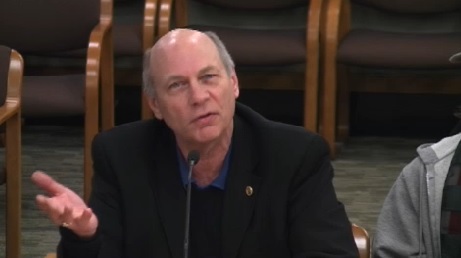 By Oregon Small Business Association
By Oregon Small Business Association
On February 16, 2015, OSBA spokesman, Tom Maginnis, testified before the Joint Senate & House Business & Labor committee on HB 2005 which mandates nearly 50 hours of paid sick leave. Maginnis gave an incredible True-Life Testimony on his own small business as listed below.
When I was working for Mark Hatfield, constituents would tell me, “You don’t understand what it’s like to run a business and make a payroll.” They were right. Now, as the former owner of three Chuck E. Cheese’s restaurants, I do. For nearly twenty years I carried a tremendous sense of responsibility for the lives of the 1,500 young people I employed. When I bought my Portland store in 1997, I employed about 74 employees. After expenses, I cash-flowed about $750,000 per year; money which I used to replace worn assets, upgrade my store, replace old games and machines, repay my commercial loans and finally, support my family.
Minimum wage doubled, wage burden quadrupled
Over the next 17 years, commodity prices did not rise appreciably, my rent stayed the same as a percentage of sales and sales rose. But beginning in 1999, the minimum wage doubled. The wage burden quadrupled. Many of the 38 taxes and fees my company paid rose as all jurisdictions; the state, county, city, Trimet, school district, water district, utilities and governing boards; all raised their fees. Each one thought its increases were small and reasonable. Each considered its to be the only cost increase. Each one had great ideas of how to spend my money. Each one had some group to care for and thought my money was the ideal way to do it.
Pay cuts and layoffs
My cash flow declined to about $125,000; a sixth of the prior total. I reduced the employee base to 36 employees. I stopped giving raises. I required longer hours from myself, my wife and my managers. My wife and I stopped taking vacations. Finally I sold my store to my corporate parent company.
New rules sold as “cost-free” that were never so
None of the jurisdictions considered the additional burden it created in the context of the additional burdens levied by its counterpart governments and their cumulative effect on the business owner and his or her employees. I now make that same accusation to those of you who want to institute a mandatory sick leave for all employees. You don’t understand what it’s like to run a business and make a payroll. And yet, more and more, you are running our businesses.
You determine how we much we pay our employees, what hours they work, what is on our menus, what equipment we can buy, how much over cost we pay for our water, sewer, electricity, garbage, what improvements we can do, what our signs say and how big they are, what our suppliers charge us (through measure 67) and a host of other costs. You may say that that is your right, and it is. But it is not your money.
Busting the “just raise prices” myth
What about just raising prices? Pricing depends on the will of the buyer, and as economics will tell you, every price increase results in fewer customers. We do not have options to the extent you think we do. For me to maintain the cash flow I had in 1997, I would have to charge almost $40 per large cheese pizza. You would not be willing to pay that.
You have convinced yourselves we pay minimum wage and withhold benefits because we are exploitative, but we are not. We live daily with our people. We want them to succeed, not because they are employees but because they are our friends and coworkers.
Paid sick leave gives public benefit using private people’s money
This bill would give a public benefit using private money. While it may not create a large macroeconomic effect to add mandatory sick leave for all employees, it will have a profound microeconomic effect. When the state levies a cost increase, marginal businesses close and healthy businesses become marginal. Owners push employees harder and pay them less, just in order to keep the doors open. Conditions make it difficult to employ teenagers, since they do not know how to work, and small businesses can no longer afford to teach them. Instead, we tend to employ older people, but we don’t offer raises very often.
Why not use public money to create a public benefit?
Having said all that, I recognize your desire to provide some compensation for Oregon workers who must take sick leave. So, why not use public money to create your public benefit? Empower the Oregon Unemployment Department to pay for sick leave. Employer and employee would have to apply together for a benefit, which would be paid from either the General Fund or unemployment insurance. The burden would be spread over all taxpayers in the state. I, for one, would gladly pay those taxes rather than to be forced to pay for a heavy-handed inflexible paid sick leave mandate law that is being proposed with HB 2005.
If the Legislature shies away from this solution, you must acknowledge that you are experiencing the same fear of loss and abuse that we individual business owners expressed. I would counsel you to be brave and recognize that you cannot ask ordinary citizens, who are controlling thousands or even hundreds of dollars in disposal capital, to do something the entire state government, with its billions of dollars, is unwilling to do.
Disclaimer: Articles featured on Oregon Report are the creation, responsibility and opinion of the authoring individual or organization which is featured at the top of every article.

